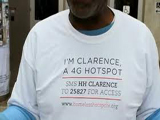Exploitation or Altruism? ‘Homeless Hotspots’ Treading a Fine Line
Post Views 0
The project ‘Homeless Hotspots’ enlists homeless people to roam the streets of Austin wearing T-shirts that say “I am a 4G hotspot.” Anybody who would like to access the internet through these human hotspots can donate any amount of money they want, which will go directly into the pockets of the homeless person.
David Gallagher wrote in the New York Times that, “It is a neat idea on a practical level, but also a little dystopian. When the infrastructure fails us… we turn human beings into infrastructure?”
Inspite of the strong criticism, BBH Labs, the firm behind the initiative, was quick to defend itself. It called it a “charitable experiment” and said that its only aim was ” to help local homeless people earn money by arming them with MiFi devices and t-shirts identifying themselves as homeless, turning them into human hotspots or technology hubs for SXSW conference-goers having a hard time getting wireless service in the area.”
Human right groups have slammed it as being “exploitative and inhumane”. What is hugely degrading is that the promotional T-Shirt that the company gives to the participants, doesn’t say, “I have a 4G hotspot.” It says, “I am a 4G hotspot.” – It turns the people into human routers.
BBH Labs Director of Innovation Saneel Radia, argues that the criticism was misplaced but a genuine attempt at philanthropy by the company, “We are not selling anything. There is no brand involved. There is no commercial benefit whatsoever.” “You pay what you want… and whatever you give goes directly to the person that just sold you access.”
Even in the face of the storm, a spokesman for the Front Steps Shelter, Austin’s Resource Center for the Homeless, praised the “Hotspots” program, telling the Daily News that the “participants chose to be involved and were thrilled at the opportunity.” One homeless individual who took part said, “These are the same people, if I were not participating in this program, who would walk past me and never stop to talk to me. But because I’m participating in this program… they’re interested in who I am. This wouldn’t happen any other way.”
Even though it does give the homeless a source of revenue, it does seem to be exploitative and unfair, as a blogger in response to the company arguing that it gives the jobless a job, emphatically expresses his disgust saying, “But it gives the homeless jobs! Yes, as would using them as human coffee tables, or hunting them as game, or having them dance for pennies in Superman outfits at your next dinner party. Working as hotspot is worse than not working at all.
The moral outrage that it has caused begets the question, “are we taking advantage of the helpless?”
Exploitation or Altruism? ‘Homeless Hotspots’ Treading a Fine Line by Harrison Barnes

